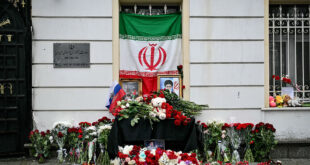BAGHDAD (Reuters) – Iraq’s main Sunni Arab bloc rejoined the Shi’ite-led government on Saturday in a breakthrough for national reconciliation after parliament approved its candidates for several vacant ministerial posts.
Getting the Accordance Front to return after it quit a year ago in a row over power sharing has been seen as key to healing divisions between majority Shi’ites and minority Sunni Arabs.
Sunni Arabs have little voice in the current cabinet, which is dominated by Shi’ites and ethnic Kurds.
“Today, parliament voted to accept our candidates … This means the Accordance Front has officially returned to the government,” a senior lawmaker in the bloc, Salim al-Jubouri, told Reuters after the vote.
“It is a real step forward for political reform.”
Jubouri, who is also the bloc’s spokesman, said the Front’s approved candidates would attend the next cabinet meeting.
Parliament questioned candidates for 10 vacant cabinet jobs, including five ministries and a deputy prime ministerial post that had previously been allocated to the Accordance Front.
The other portfolios were left largely vacant when separate Shi’ite and secular factions quit Prime Minister Nuri al-Maliki’s government last year. They will be filled by politicians from other parties.
Maliki had earlier approved the names for all the posts, which were not for any key security or economic positions.
Rafie al-Esawi from the Front was approved as one of Iraq’s two deputy prime ministers. Iraq’s other deputy prime minister is Barham Salih, a prominent Kurd.
The Front pulled out of Maliki’s cabinet in August last year, demanding a greater say in security policies as well as the release of mainly Sunni Arab detainees. Most of its cabinet seats were never filled at the time.
An amnesty law passed in February has begun the process of releasing many prisoners from the Sunni Arab community. Sunni Arabs form the bulk of inmates after security forces detained thousands in sweeps at the height of a Sunni Arab insurgency.
The Front has been on the verge of rejoining the government several times in the past, only for obstacles to suddenly emerge.
But government crackdowns against Shi’ite militias in the southern city of Basra in late March and then in Baghdad were welcomed by the Front and helped spur its return.
“After some dithering … (the Front) very quickly rallied around the prime minister, post Basra,” said a senior U.S. official in Baghdad who declined to be identified.
“There’s a new and more welcome spirit of unity.”
The political rapprochement has also been a factor in the warming of ties between Baghdad and Sunni Arab states.
Until recently, Arab capitals maintained only low-level ties with Baghdad partly because they believed of minority Sunni Arabs in Iraq were victims of sectarian policies.
 Eurasia Press & News
Eurasia Press & News



